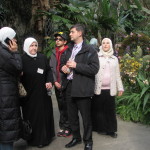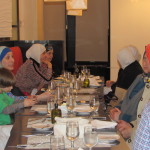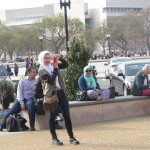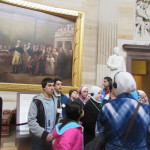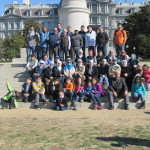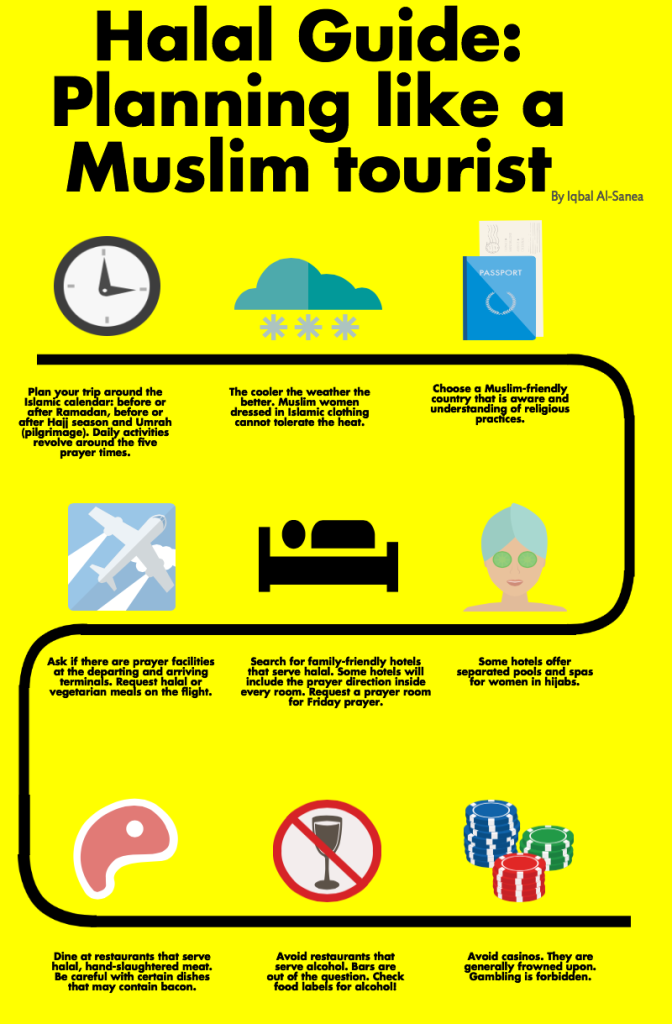Leena Demashkieh and a group of 100 people from her Muslim Unity Center in Bloomfield Hills, Michigan, traveled to Washington, D.C.. The families visited the Capitol, the National Mall, the Washington Monument, and the National Zoological Park. They were your average tourists until they made stops to eat at halal restaurants, pray together in a private room and occasionally listen to Islamic lectures at the end of the day. The group was practicing what is now called Halal Tourism.
“The kids love it. They’re not alone. They play games together; they swim together, they pray together, they eat halal together. It’s the power of supporting each other,” Demashkieh said.
- National Park.
- Dining at a halal restaurant.
- Touring.
- Reserved prayer room at the hotel.
- Touring.
- Washington, DC
An Islamic travel agency, Dar El Salam, organized their trip to Washington, D.C. amongst many others. The agency is known for its Hajj and Umrah, pilgrimage to Mecca , but they have recently offered packages to Morocco, Turkey, Spain, Emirates and Malaysia. Cruises and Disney packages are also some clients’ favorites. They design their trips to cater and address Muslim needs.
“Halal is having prayer area, access to halal food, and if your tour guide is not Muslim, he at least understands what your requirements are as a Muslim. like stopping for prayer. Also, the environment that you’re in,” Ibtissam Fermas, operations manager for Dar El Salam, said. “We want to make sure it’s not just two people; it’s like 40 people together. There is strength in number when you travel together. When you travel by yourself, you’re a little apprehensive, especially when you’re in a foreign country. It’s foreign as it, let alone having to stop for prayer and then everyone on the bus is like ‘why do you have to stop?’”
According to a study published by Crescent Rating’s Global Muslim Index Travel, the Muslim population has been growing rapidly across the world. From about 1.8 billion in 2010, the global Muslim population is estimated to be about 2.5 billion by 2030.
Muslim travelers represent 10 percent of the entire travel economy, or 108 million people. This number is expected to reach 11 percent with 150 million Muslim travelers by 2020. Airlines, hotels, cruises, theme parks and restaurants have just started to pay attention to the vast number of Muslims travelling across the world.
What exactly do Muslims search for when they book their trips? A family-friendly destination, safe travel environment, halal dining options, prayer access in numerous locations such as airports and theme parks, ease of communication and a country that is aware of Muslim lifestyle. Malaysia, Turkey, and the United Emirates were ranked the top three that accommodate the latter.
The main reason for this is faith and Islamic rules are affecting their travel and purchasing decisions. Muslims are searching for hotels that offer halal food, offer prayer rooms with prayer direction, and private villas with private pools and segregated spas for women in hijabs.
Singapore, as a non-Islamic country, has recently climbed the chart due to its large variety of halal restaurants (that accumulate to about 10,000. Other non-Islamic countries that made it to the top 10 are the United Kingdom, France, Belgium and South Africa. According to the Muslim Traveler Index, Taiwan’s number of halal certified restaurants has doubled in the last two years.
“The world is changing. So when we did the Alaska cruise last year, it was really difficult for them to understand halal. They tried to push us towards Kosher because that’s what they are used to. This year, it was so much easier because we already dealt with the group. It took them two months to approve it (halal dining), but this year it was done within a week because they already understood it,” Fermas said.
Many female Muslims wear traditional Islamic clothing, which may include the hijab or niqab. They take into consideration the friendliness and understanding of the country, along with the weather conditions. Many prefer cooler areas.
“I was against the (Alaska) cruise. We all have the hijabs. I didn’t feel like it was the right place, but when we went as a group, it was different and the weather helped,” Demashkieh commented about their Alaska cruise.
Prayer facilities within the country are also important. Muslim travelers require it to be clean and quiet. Before the actual prayer, Muslims are required to perform “wudu,” an Islamic procedure for washing body parts with water. That means the prayer facility must have bathrooms or washrooms inside or close by as well.
“Today, you’ll even find worship rooms with prayer rugs at airports sometimes. You’ll find the prayer direction and Quran inside too,“ Demashkieh said.
What do Muslims do in countries that are worth visiting, but are not halal-friendly or are not aware of Islamic rules?
“I’m actually doing a package to Peru,” Fermas said. ‘I looked for agencies throughout and I couldn’t find anyone who did or understood what Muslim is, so I contacted a mosque there, and then they recommended me to other people. It’s all about the resort and facilities. You can’t do anything about your surroundings. There are some things you just can’t control.
You’re not going to get everything because the country is not halal, but you want to make sure the people are comfortable. That’s what halal is about.”
Crescent Rating and Halal Trip are two of the world’s leaders in halal tourism. Online users may book their trips using websites such as the latter, US Halal Booking, and Halal Voyage. Technology has played a significant role in halal tourism. Muslim travelers have become familiar with apps such as Zabihah, an Islamic version of Yelp, Islamic Finder for prayer times, prayer compass and the Quran.
“We use phone apps for Quran, morning and evening prayers, prayer times. We also Google most of the restaurants we eat at, “ Demashkieh said.
The co-director of the Original Halal Food Festival, Samira Amer, is happy to see non-Islamic countries such as the United States participate in halal tourism.
“Non-Muslim restaurants seeing the value of our halal food festivals, and changing their menu by going the zabihah route, I was shocked! I was like this is the start of something amazing. I’m not going to see airlines or Disney World have halal options for us, maybe my daughter will take her kid and see that,”Amer said.
